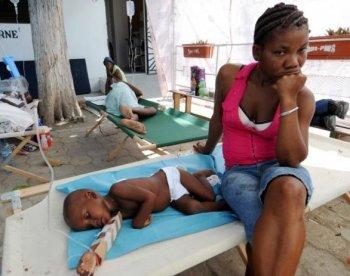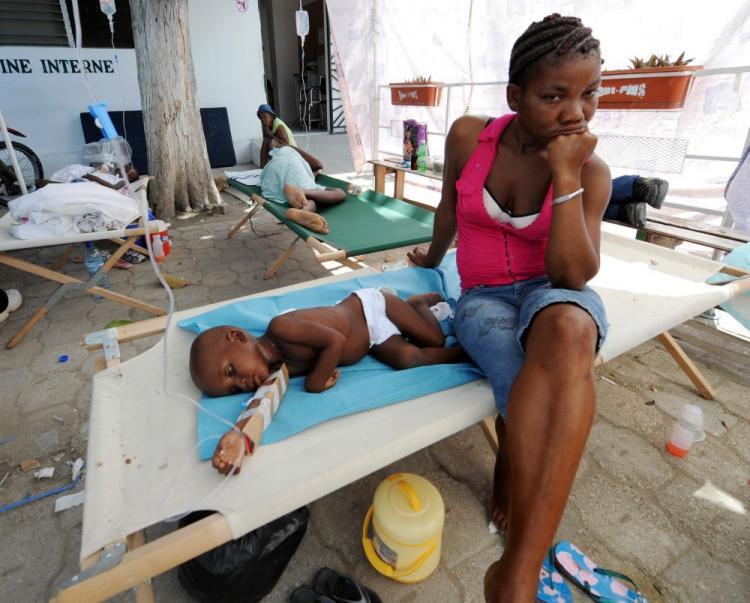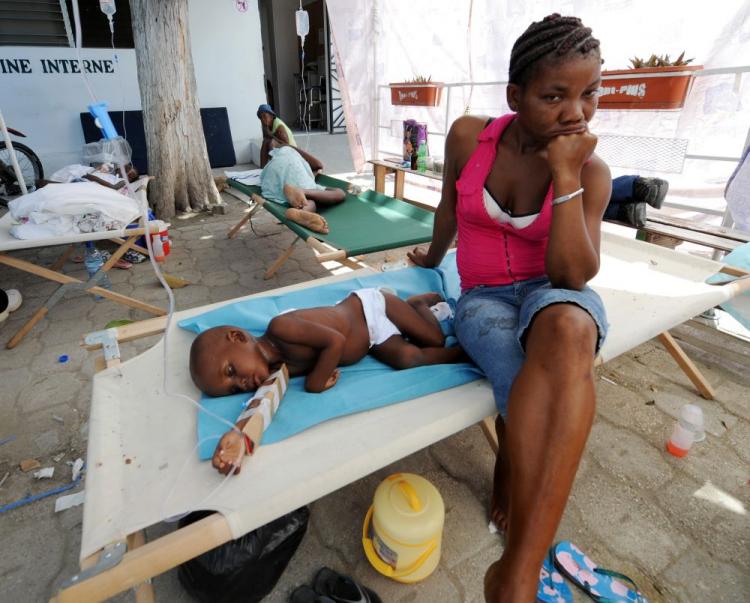Over 250 people have died of cholera and another 3,015 people reportedly infected in Haiti, four days after the start of an outbreak. The latest figures were reported Sunday evening by the Pan American Health Organization (PAHO), which is working closely with the government-led response to the epidemic.
The United Nation’s Relief Web is calling it the “latest emergency after [the] huge Jan. 12 quake.”
To date, most deaths are taking place in the community, about 54 percent, while 46 percent of the deaths occurred in health facilities.
PAHO reports that 12 cholera treatment centers are being set up to support isolation and treatment of cases: six in Artibonite, five in Port-au-Prince, and one in Central Haiti.
The cholera outbreak hit after heavy rains caused the Artibonite River to flood the area.
According to Haitian Health Official Gabriel Thimote, the rate of increase in fatalities from new infections was starting to stabilize with only 33 new deaths in the previous 24-hour period.
The appearance of infections in the populous capital of Port-au-Prince raised concerns that the disease could quickly spread in the city. The patients did not catch the cholera in the capital, however, but arrived already ill from affected areas.
The U.N. Organization for the Coordination of Humanitarian Affairs told reporters that Port-au-Prince is not a new location of infection and so it was not a spread of the epidemic.
In Haiti many people still live in temporary camps since last January’s earthquake killed 300,000 and left more than a million people homeless.
“The situation continues to evolve each day, and officials are putting in place plans for a worst case scenario involving a national outbreak,” reads the PAHO report.
The U.N. stated Friday the humanitarian community is helping the country with medical supplies and teams of health workers.
Catherine Bragg, deputy emergency coordinator, told a news conference cholera deaths can be prevented. Cholera is caused by a bacterial infection and can quickly dehydrate patients by diarrhea and vomiting. She said clean water, using soap, and improving sanitation helps. She reported that 300,000 doses of antibiotics, 10,000 boxes of water purification tablets, and 2,500 buckets, jerry cans, and hygiene kits are being sent to Haiti.
Overall, the post-quake situation in Haiti is still far from stable and the U.N. will be looking for more international support for the country.
“Given the amount that still needs to happen in terms of rehabilitating housing, removing rubble, and re-establishing basic services in areas people are returning to, even in the best case scenario this is not going to happen overnight. So we will be relaunching a humanitarian appeal in January,” said Bragg.
The United Nation’s Relief Web is calling it the “latest emergency after [the] huge Jan. 12 quake.”
To date, most deaths are taking place in the community, about 54 percent, while 46 percent of the deaths occurred in health facilities.
PAHO reports that 12 cholera treatment centers are being set up to support isolation and treatment of cases: six in Artibonite, five in Port-au-Prince, and one in Central Haiti.
The cholera outbreak hit after heavy rains caused the Artibonite River to flood the area.
According to Haitian Health Official Gabriel Thimote, the rate of increase in fatalities from new infections was starting to stabilize with only 33 new deaths in the previous 24-hour period.
The appearance of infections in the populous capital of Port-au-Prince raised concerns that the disease could quickly spread in the city. The patients did not catch the cholera in the capital, however, but arrived already ill from affected areas.
The U.N. Organization for the Coordination of Humanitarian Affairs told reporters that Port-au-Prince is not a new location of infection and so it was not a spread of the epidemic.
In Haiti many people still live in temporary camps since last January’s earthquake killed 300,000 and left more than a million people homeless.
“The situation continues to evolve each day, and officials are putting in place plans for a worst case scenario involving a national outbreak,” reads the PAHO report.
The U.N. stated Friday the humanitarian community is helping the country with medical supplies and teams of health workers.
Catherine Bragg, deputy emergency coordinator, told a news conference cholera deaths can be prevented. Cholera is caused by a bacterial infection and can quickly dehydrate patients by diarrhea and vomiting. She said clean water, using soap, and improving sanitation helps. She reported that 300,000 doses of antibiotics, 10,000 boxes of water purification tablets, and 2,500 buckets, jerry cans, and hygiene kits are being sent to Haiti.
Overall, the post-quake situation in Haiti is still far from stable and the U.N. will be looking for more international support for the country.
“Given the amount that still needs to happen in terms of rehabilitating housing, removing rubble, and re-establishing basic services in areas people are returning to, even in the best case scenario this is not going to happen overnight. So we will be relaunching a humanitarian appeal in January,” said Bragg.







